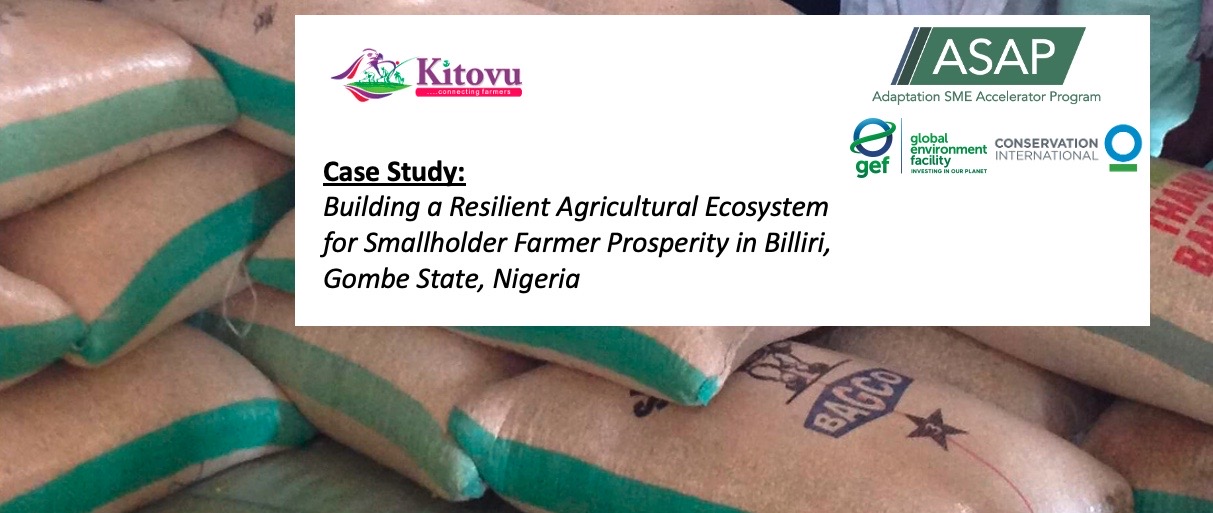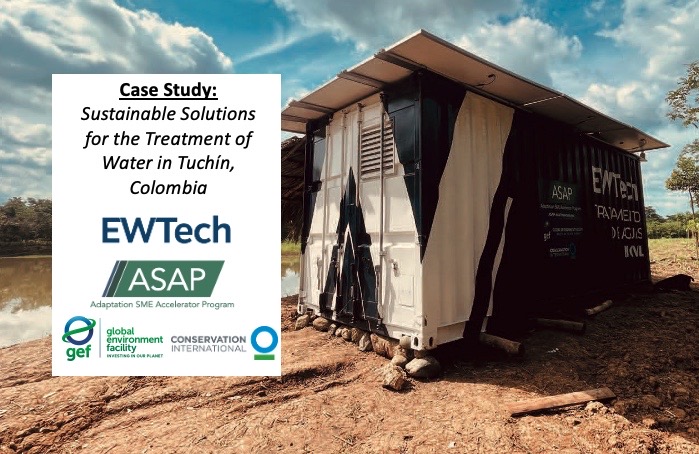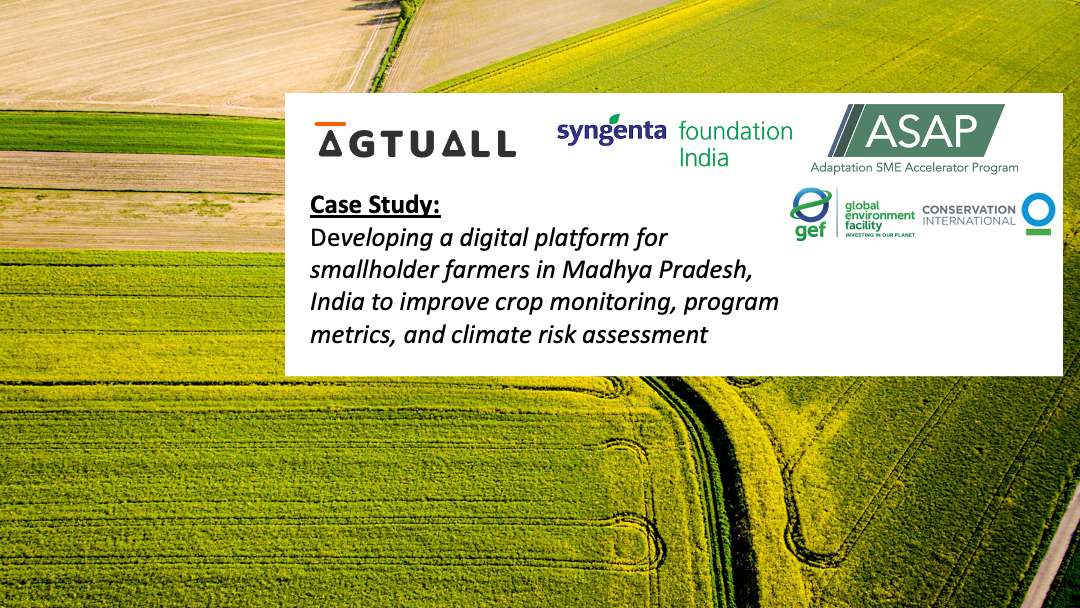August 8, 2023
“Building a Resilient Agricultural Ecosystem for Smallholder Farmer Prosperity in Billiri, Gombe State, Nigeria” Case Study published after a successful collaboration between Kitovu Technology Company and ASAP

Kitovu Technology Company and the Adaptation SME Accelerator Program publish a case study upon the completion of a successful collaboration to train farmers, especially in Billiri, Gombe State on post-harvest management thereby contributing to farmers’ economic sustainability.
August 8, 2023 – Billiri, Gombe State, Nigeria: Kitovu Technology Company and the Adaptation SME Accelerator Program (ASAP) announced today the publication of a Case Study – “Building a Resilient Agricultural Ecosystem for Smallholder Farmer Prosperity in Billiri, Gombe State, Nigeria.” The Case Study is published after a collaboration between the partners to train smallholder farmers in post-harvest management, provide access to effective storage, which helps unlock financing for smallholder farmers, mitigate post-harvest losses, enhancing their economic sustainability while driving financial inclusion.
Kitovu Technology Company conducted training on effective post-harvest management techniques for smallholder farmers in Billiri and its surroundings, Balanga, and Kaltunga, aimed at minimizing post-harvest losses and improving produce quality through proper drying, storage, pest control, handling practices and the utilization of climate-adaptive agronomic advisory services. In addition, access to post-paid storage was provided to the farmers, alongside Kitovu’s proprietary electronic warehouse receipt system, StorageX, which enabled farmers leverage their goods under storage as collateral to receive financing. The project engaged stakeholders like commodity buyers and financial institutions to secure financing options and market access for the farmers and creating sustainable opportunities and linkages for the smallholder farmers involved in the project. The outcome of the project includes 543 farmers, including 79 women, receiving comprehensive training, and 307 farmers successfully storing 400 tons of grains, leading to a 20% reduction in post-harvest losses, saving an estimated $23,000 in value. Surveys were conducted to understand farmers’ needs and challenges. The surveys covered various aspects, including farmers’ access to storage facilities, their knowledge of optimal market timing, and the affordability of agricultural inputs. The close-out survey showed significant improvements, with 68.9% of farmers preserving 80-100% of their harvests, 81.6% earning enough to pay upfront for inputs, and 36.9% making increased income per ton of grain due to a 50% commodity price increase during the storage period.
Read more about the project in the Case Study
“Providing post-harvest management training and access to Electronic Warehouse Recipts backed by goods under storage in our storage infrastructure is a gamechanger for smallholder farmers in Nigeria, because not only are smallholder farmers able to cut down post-harvest losses, but their incomes increased significantly when they took advantage of market price appreciation during the storage period. And as a result, they can afford quality climate-adapted inputs. The reduction in post-harvest losses as a result, also means a reduction in the emission of greenhouse gasses from decaying food waste! With strategic partnerships with funders, we can help engineer a resilient food system for Africa!” – Emeka Nwachinemere, CEO of Kitovu Technology Company.
“As climate impacts continue to affect agricultural yield and the food supply chain, smallholder farmers need greater access to data, analysis, and climate resilient inputs which are often out of economic reach for those who live from harvest to harvest. This pilot demonstrates the potential of StorageX to increase the economic and climate resilience of smallholder farmers by decreasing food waste and increasing farmer profits, enabling the purchase of more climate resilient inputs facilitated through Kitovu’s technology platform. I look forward to seeing this program scale both locally and across Africa.” – Brian Parham, Program Director of ASAP
About the Partners:
Kitovu Technology Company
Kitovu Technology Company provides African smallholder farmers with the data to make smartdecisions about what to grow that would sell and how to grow them optimally, so as to enablethem to make more money off their farms through yield improvement and reduced post-harvestlosses. We have developed several innovative products at the intersection of agriculture, supply chain, and finance, transforming African agriculture. For more information, visit www.kitovu.com.ng
The Adaptation SME Accelerator Program (ASAP) and The Lightsmith Group
ASAP is a program dedicated to assisting small and medium-sized enterprises (SMEs) in adapting to climate change impacts. It offers tailored support and resources to vulnerable SMEs in developing countries. ASAP focuses on capacity building, mentorship, and access to financing, helping SMEs identify climate risks and implement resilience strategies. The project aims to integrate climate resilience into SMEs’ business models and foster sustainable practices. Through its targeted efforts, ASAP contributes to enhancing the adaptive capacity of SMEs in the face of climate challenges. ASAP is led by the Lightsmith Group with funding from the Global Environment Facility’s Special Climate Change Fund and the Inter-America Development Bank. ASAP is facilitated by Conservation International. For more information on ASAP, visit www.climateasap.org and about The Lightsmith Group visit www.lightsmithgp.com.
Conservation International
Conservation International protects nature for the benefit of humanity. Through science, policy, fieldwork and finance, we spotlight and secure the most important places in nature for the climate, for biodiversity and for people. With offices in 30 countries and projects in more than 100 countries, Conservation International partners with governments, companies, civil society, Indigenous peoples and local communities to help people and nature thrive together. Go to Conservation.org for more, and follow our work on Conservation News, Facebook, Twitter, TikTok, Instagram and YouTube.
The Global Environment Facility (GEF)
The GEF is a family of funds dedicated to confronting biodiversity loss, climate change, pollution, and strains on land and ocean health. Its grants, blended financing, and policy support helps developing countries address their biggest environmental priorities and adhere to international environmental conventions. Over the past three decades, the GEF has provided more than $22 billion and mobilized $120 billion in co-financing for more than 5,000 national and regional projects. For more information visit www.thegef.org.

